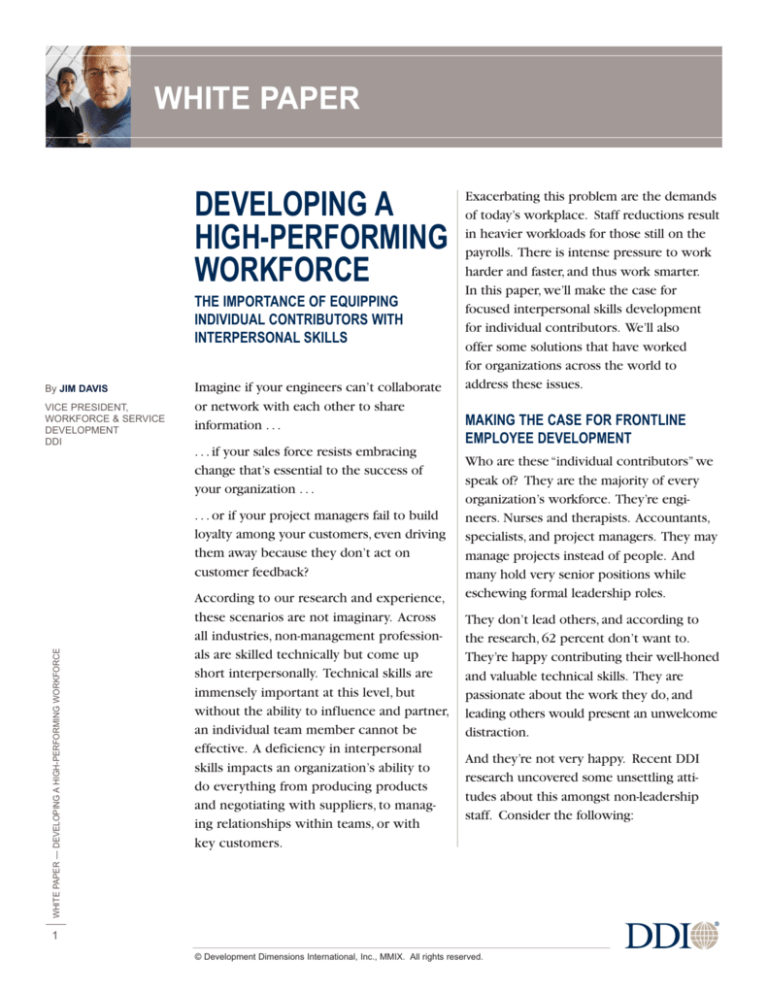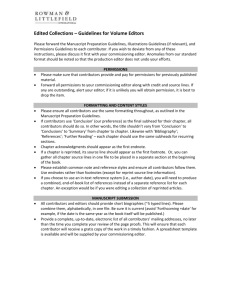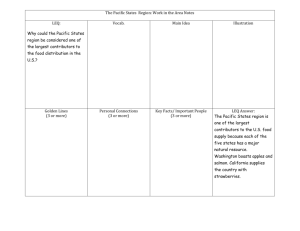
WHITE PAPER
DEVELOPING A
HIGH-PERFORMING
WORKFORCE
THE IMPORTANCE OF EQUIPPING
INDIVIDUAL CONTRIBUTORS WITH
INTERPERSONAL SKILLS
By JIM DAVIS
VICE PRESIDENT,
WORKFORCE & SERVICE
DEVELOPMENT
DDI
Imagine if your engineers can’t collaborate
or network with each other to share
information . . .
. . . if your sales force resists embracing
change that’s essential to the success of
your organization . . .
WHITE PAPER — DEVELOPING A HIGH-PERFORMING WORKFORCE
. . . or if your project managers fail to build
loyalty among your customers, even driving
them away because they don’t act on
customer feedback?
According to our research and experience,
these scenarios are not imaginary. Across
all industries, non-management professionals are skilled technically but come up
short interpersonally. Technical skills are
immensely important at this level, but
without the ability to influence and partner,
an individual team member cannot be
effective. A deficiency in interpersonal
skills impacts an organization’s ability to
do everything from producing products
and negotiating with suppliers, to managing relationships within teams, or with
key customers.
Exacerbating this problem are the demands
of today’s workplace. Staff reductions result
in heavier workloads for those still on the
payrolls. There is intense pressure to work
harder and faster, and thus work smarter.
In this paper, we’ll make the case for
focused interpersonal skills development
for individual contributors. We’ll also
offer some solutions that have worked
for organizations across the world to
address these issues.
MAKING THE CASE FOR FRONTLINE
EMPLOYEE DEVELOPMENT
Who are these “individual contributors” we
speak of? They are the majority of every
organization’s workforce. They’re engineers. Nurses and therapists. Accountants,
specialists, and project managers. They may
manage projects instead of people. And
many hold very senior positions while
eschewing formal leadership roles.
They don’t lead others, and according to
the research, 62 percent don’t want to.
They’re happy contributing their well-honed
and valuable technical skills. They are
passionate about the work they do, and
leading others would present an unwelcome
distraction.
And they’re not very happy. Recent DDI
research uncovered some unsettling attitudes about this amongst non-leadership
staff. Consider the following:
1
© Development Dimensions International, Inc., MMIX. All rights reserved.
>
Fifty-one percent of the U.S. workforce
reports feeling that their careers are
stagnant, according to DDI’s report
“Pulse of the Workforce: 2009 Survey
of Individual Contributors.”
>
Of those stagnant workers, 44 percent
plan to look for a new job as soon as
the economy improves.
>
When looking at organizations where DDI
has surveyed and found low engagement,
less than 7 in 10 professional individual
contributors feel that there is positive
cooperation in their work group to get
the job done.
WHITE PAPER — DEVELOPING A HIGH-PERFORMING WORKFORCE
These negative feelings appear to be
festering below the surface—out of sight
for leadership, but on the minds of individual contributors. Looking at the big picture
painted by this research, we see that a high
percentage of the workforce is disgruntled
and disengaged. They don’t feel their work
is challenging or that their organizations
care about their careers. They lack opportunity to grow. Training resources are often
invested in their leaders, and leave this population hungry for development and resentful when it’s not delivered.
They’re motivated to find better opportunities
elsewhere. As organizations look forward to
the end of the global recession and getting
past the problems it presents, they’re facing a
new set of problems. When hiring picks up
again, companies will need to fight as hard
to keep the employees they have as for those
they want to hire.
SOLVING THE INDIVIDUAL
PERFORMER PUZZLE
Clearly, organizations need strategies for
these valuable contributors, some of whom
will ascend to very senior positions managing projects and innovation rather than
people. Organizations need to tap into the
discretionary effort and creativity of their
individual contributors and for them to be
as productive as possible. And they need to
demonstrate a commitment to these workers that inspires them to be engaged and to
stay for the long term.
What’s more, to be relevant and financially
defensible in these times, strategies need to
have a clear payoff for both the individual
contributors and the organization. These
people enable the business to meet its
goals. And they give staffs the skills needed
to execute on those goals. Technical skills
are, of course, critically important, but our
research shows that this audience needs
to be just as adept in what we call the
“individual contributor imperatives.”
Individual contributors agree—technical
skills and interpersonal skills are equally
important for success.
The individual contributor imperatives focus
on interpersonal skills that endure for a
career, serving the most effective associates
in all endeavors. That is, to be effective in
their jobs and in how they contribute to
organizational success, they must influence
through personal effectiveness, partner with
others, and build customer loyalty. We’ll
explore each imperative in depth here.
2
© Development Dimensions International, Inc., MMIX. All rights reserved.
Imperative 1:
Influence Through Personal
Effectiveness
What happens when an individual
contributor interacts with a colleague?
Or a key supplier? Or a customer? Can
that person meet his (or her) own needs
during that interaction? Is he cognizant
of what his partner needs as well? When
working with others, can he take feedback,
react well to change, and prevent (or at
least, successfully manage) conflict? Does
he inspire feelings of trust?
An associate with the most advanced technical skills is destined to fail if he does not
have the skills to be effective in interactions
with others. These skills are important for
leaders, but perhaps even more important
for individual contributors who lack “position power.” These associates need other
ways to elicit the support and commitment
of their coworkers, and even leaders in
some cases.
for, and how to act on what they hear. For
example, can someone link the non-verbal
cues they observe with the conversation
they’re having? When a colleague or
customer provides feedback, does that
individual recognize and act on it? Or
do they only “listen to refute?” When an
individual can demonstrate that they are
open to others’ messages and know what
to do with the information, interactions
with colleagues are vastly improved.
>
Be an Agent of Change. Organizations
are constantly evolving, and perhaps no
harm is done if an associate passively
accepts change. However, no good is done
either. Your most valuable individual contributors are the ones who will embrace
and initiate change. They are the ones
who can drive the improvement and innovation that an organization so desperately
needs to outperform the competition.
>
Prevent, Don’t Resolve. If there’s
personal conflict in a workplace, the
situation has gone too far. The drama
associated with conflict is fodder for
countless sitcoms and movies, but in the
real world it only leads to unproductive
discord and dispute. Skilled associates
know how to recognize the signs of conflict and de-escalate a situation before it
boils over. They know how to “work it
out.” If individual differences are acknowledged and leveraged they can be a source
of positive energy for an organization.
>
Bottom line: Trust. Some people offer
trust willingly, with others it must be
earned first. With either approach, a lack
of the interpersonal skills we’ve just
outlined here will damage trust—often
irrevocably. We’ll discuss trust further
under the next imperative.
Here are some of the most important ways
individual contributors will use personal
effectiveness skills:
WHITE PAPER — DEVELOPING A HIGH-PERFORMING WORKFORCE
>
>
Personal and Practical Needs.
Whether dealing with internal partners or
external clients, basic interpersonal skills
encourage an individual to formulate a
win/win approach. That is, in the process
of meeting one’s own needs, those with
solid personal effectiveness skills think
about not only what their internal and
external customers need to get out of an
interaction from a practical standpoint,
but what one needs to do to meet their
emotional/personal needs as well.
Listen to Learn. Just listening to
someone else isn’t enough, associates
need to understand what they’re listening
3
© Development Dimensions International, Inc., MMIX. All rights reserved.
In our consultation with clients, we’ve seen
firsthand how beneficial interpersonal skills
that transform one-on-one interactions can
be. One example that comes to mind is a
global energy and fuel provider. This organization wanted to improve basic interaction
skills, so they created a curriculum that
addressed communication, handling conflict,
and managing change. It’s now provided to
all new employees around the world as part
of the organization’s new hire orientation.
People learn early that strong interpersonal
skills are important to the organization and
how to work better together in order to
improve quality and productivity and meet
organizational goals. For another organization, an automotive manufacturer, rapid
expansion of plants drove the need to
balance technical expertise with interpersonal skills. A curriculum including communication, feedback, managing change, and
resolving conflict helped the organization
increase their global market share in this
highly competitive market.
What makes team interactions different
from one-on-one interactions? Several
things. For one, teams move through
stages of development, starting as a mere
gathering of individuals, then moving
through a process developing norms and
likely even managing conflict. Effective
teams will sort out their differences in
order to be functional. Ineffective teams
(populated by individuals lacking team
effectiveness skills) will get stuck along
the way, becoming mired in conflict or
differences that will stand in the way of
the group’s goals.
So what makes teams successful? We’ve
identified five factors, and they’re all
centered around interpersonal skills:
>
Results. Team members have a clear
focus on results when they understand
the team’s purpose; they can explain their
team’s long and short-term goals, as well
as detail how they support the larger
organizational goals. Setting and reaching
team goals requires collaboration and
influence, the ability to reach agreement,
review progress, and sometimes manage
conflict.
>
Process. To get things done, teams must
have processes to complete tasks, identify
problems, and reach agreement. Skills
such as checking for understanding, organizing meetings by making agendas and
tracking agreement, and conducting regular reviews of how work is accomplished
are important to develop team processes.
>
Communication. Respect is at the core
of any successful team. And respect is
earned when team members exhibit good
listening skills, resolve conflict, effectively
share information, and are open to new
ideas... even those judged to be too “wild
and crazy” at first examination.
WHITE PAPER — DEVELOPING A HIGH-PERFORMING WORKFORCE
IMPERATIVE 2: PARTNER WITH OTHERS
As part of recent research we asked a sample
of individual contributors to define their
level in the company, and the most popular
answer by far was “team member.” Every
associate has an immediate work group,
typically comprised of a leader, colleagues
who also report to that person, and key
members of other teams who help get
work done. But beyond an immediate team,
many also serve on a number of other ad
hoc teams. Examples include project teams,
quality teams, task forces, committees, and
guilds. Team members have responsibilities
to meet team needs. And to carry out
responsibilities to teams, individual contributors need solid partnership skills.
4
© Development Dimensions International, Inc., MMIX. All rights reserved.
WHITE PAPER — DEVELOPING A HIGH-PERFORMING WORKFORCE
>
Commitment. Team members show
their full commitment by being willing
to take risks and make the difficult
decisions necessary to achieve high levels
of performance. Doing this well requires
the desire to be involved, the willingness
to accept accountability, and the skills to
make decisions and take action.
>
And That Bottom Line: Trust. To
inspire trust and be able to trust others,
team members must be able to admit
mistakes, ask for help, share openly, and
live up to their agreements. They should
also value differences of style and opinion,
rather than dismissing anything different
without further investigation.
One additional group-based skill to bear
in mind for individual contributors is
networking. Business networking is
different than social networking, in that
it’s purposeful. In addition to collecting
contacts who may be useful down the
road, business networking pinpoints
network contacts who can contribute
their information and expertise to help an
individual reach his or her goals . . . now.
Additionally, individuals need to know
how to reciprocate, helping others when
the time comes. Finally, business networking requires courage. For many it can be
scary to reach out and ask for help, and
organizations need to foster skills that
enable courageous networking.
Our clients provide compelling anecdotes
as to why team skills are so important.
In fact, numerous clients have approached
us with the need to improve their teams’
performance by focusing in key interpersonal (rather than technical) skills. An
example: a business services company
was moving to a shared services model.
Their staff needed better skills to improve
processes and work together better as
a team. Training their associates in
process improvement, decision making,
and quality orientation helped drive
continuous improvement and develop
group effectiveness skills.
BUILD CUSTOMER LOYALTY
Customer retention is a key organizational
priority. The word “customer” appears in
almost all organizational mission/vision statements, and most organizations have strategic
priorities that focus on customer satisfaction
and loyalty. A small increase in customer
retention can result in major gains in profitability. This fact is well known in the
executive suite. Regardless of the economy
or other forces, building customer loyalty
has been and always will be essential.
And largely, the day-to-day management of
customers falls to an organization’s individual contributors, who serve as the face of
their company. They’re answering the
phones, selling and marketing the products,
delivering the goods, and most importantly,
handling the relationship between the
organization and the customer. With key
accounts, the dollar value of these relationships can be seven figures. One can argue
that the quality of that relationship is only
as good as the quality of the interpersonal
skills of the person managing it.
Direct contact with an external customer
isn’t the only way customer service skills
have impact. Individual contributors are in
the best position to work with their internal
partners to improve an organization’s service
experience. They need the drive and the
skills to work in the customer’s favor as part
of the chain of service.
5
© Development Dimensions International, Inc., MMIX. All rights reserved.
WHITE PAPER — DEVELOPING A HIGH-PERFORMING WORKFORCE
Many of the basic interpersonal skills, such
as listening, communicating, and building
trust, are essential for interactions with customers. Some additional interaction skills
include: Making the customer feel important, understood, and involved; managing the
customer interaction; and knowing what to
do when confronted with a dissatisfied customer (internal or external).
>
So what interaction skills are important for
driving customer loyalty? We’d generalize
them this way:
Not surprisingly, we have a plethora of
examples from our own customers of how
customer loyalty is important. A security
company needed to improve skills among
its customer service representatives . . .
a health care organization needed all
associates to improve skills in order to
drive patient satisfaction (a key industry
metric) . . . a furniture retailer distinguishes
itself in the marketplace because of the
exemplary service its associates provide,
and the company continually develops
customer-focused interaction skills. In all
of these cases, improving customer service
skills improves the company’s bottom line.
>
Seek understanding. Those who handle
customers well will always be asking,
“what does my client want, and how
can I exceed that expectation?” They’ll
actively involve the customer and seek
clues to his or her personal and practical
needs. These individuals are also skilled
in confirming satisfaction at the end of an
interaction to ensure all needs are met.
>
Client-centric communication.
Those facing customers not only need
to understand their clientele’s needs, but
communicate to meet those needs. This
means acknowledging needs, so customers
understand that the organization’s representative is truly listening. It also entails
clarifying needs to avoid assumptions
and ensure that the right need is being
met. Other skills include the ability to
appropriately share rationale around why
something is done a certain way, and to
communicate positively in a way that
makes the customer feel valued.
Take the heat. It’s a fact, customers will
be disappointed if their personal and/or
practical needs are not being met. How
an individual handles that dissatisfaction
will make or break the relationship. It’s
an advanced skill . . . being able to turn
around a bad experience and retain a
customer. But it’s a skill that is absolutely
pivotal nonetheless.
CONCLUSIONS
Technical skills are the price of entry. To
use a sporting analogy, they’ll gain someone
access to the game, but to get on the field
and be a star player that individual needs
interpersonal abilities. Merely understanding the game is not enough.
Think of today’s top athletes. The vast
majority are part of teams. They need to
know how to pass a ball to a teammate,
6
© Development Dimensions International, Inc., MMIX. All rights reserved.
or signal that they’re open, or run with it
when the game changes. A rogue loner on
the field will not only cause the team to fail
to achieve its goals, but may actually keep
him from meeting his own goals, particularly
when those goals include advancing his
career in his chosen field. And even those
who compete individually need to rely on
a team of trainers and coaches to achieve
their goals.
LOOKING FOR MORE?
Delve into our study,“Pulse of the
Workforce” for more insights about this
key segment within your organization.
To get your copy of this study, and to
read more about how DDI can help your
individual contributors become exceptional
performers, visit us at ddiworld.com.
Individual contributors who comprise
today’s workforce are no different. They can
be merely players, or with the right skills,
they can be truly exceptional performers.
CONTACT INFORMATION
WORLD HEADQUARTERS
412.257.0600
E-MAIL INFO@DDIWORLD.COM
WHITE PAPER — DEVELOPING A HIGH-PERFORMING WORKFORCE
WWW.DDIWORLD.COM/LOCATIONS
ABOUT THE AUTHOR
Jim Davis is a recognized expert in combining selection, development, and senior management support to create
high-performing organizations. He has helped many organizations succeed in today’s highly competitive global
business environment. Having held a variety of key positions in product development, marketing, and product
management since joining DDI in 1987, Jim has served as product manager for the Interaction Management®:
Exceptional Performers (IM: ExPSM), Service Plus®, Leadership Mirror®, OPAL®, Techniques for a High-Performance
Workforce®, and Resources Management® product lines. His clients include American Home Shield, HCA, Hilton,
Lockheed Martin, Nebraska Furniture Mart, OrthoCarolina, Subaru and Warner Bros.
7
MKTWDSWP01-12090MA
© Development Dimensions International, Inc., MMIX. All rights reserved.








